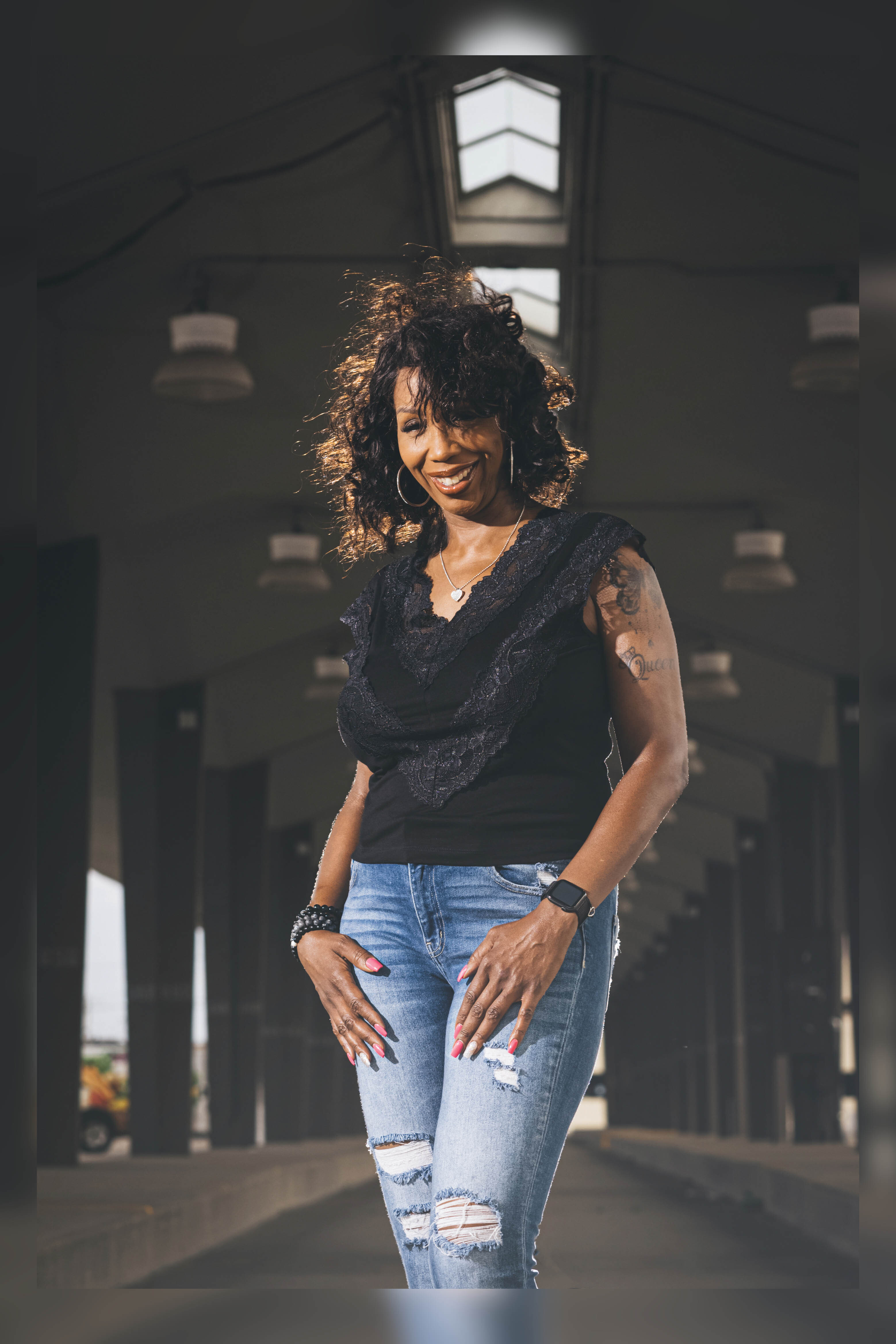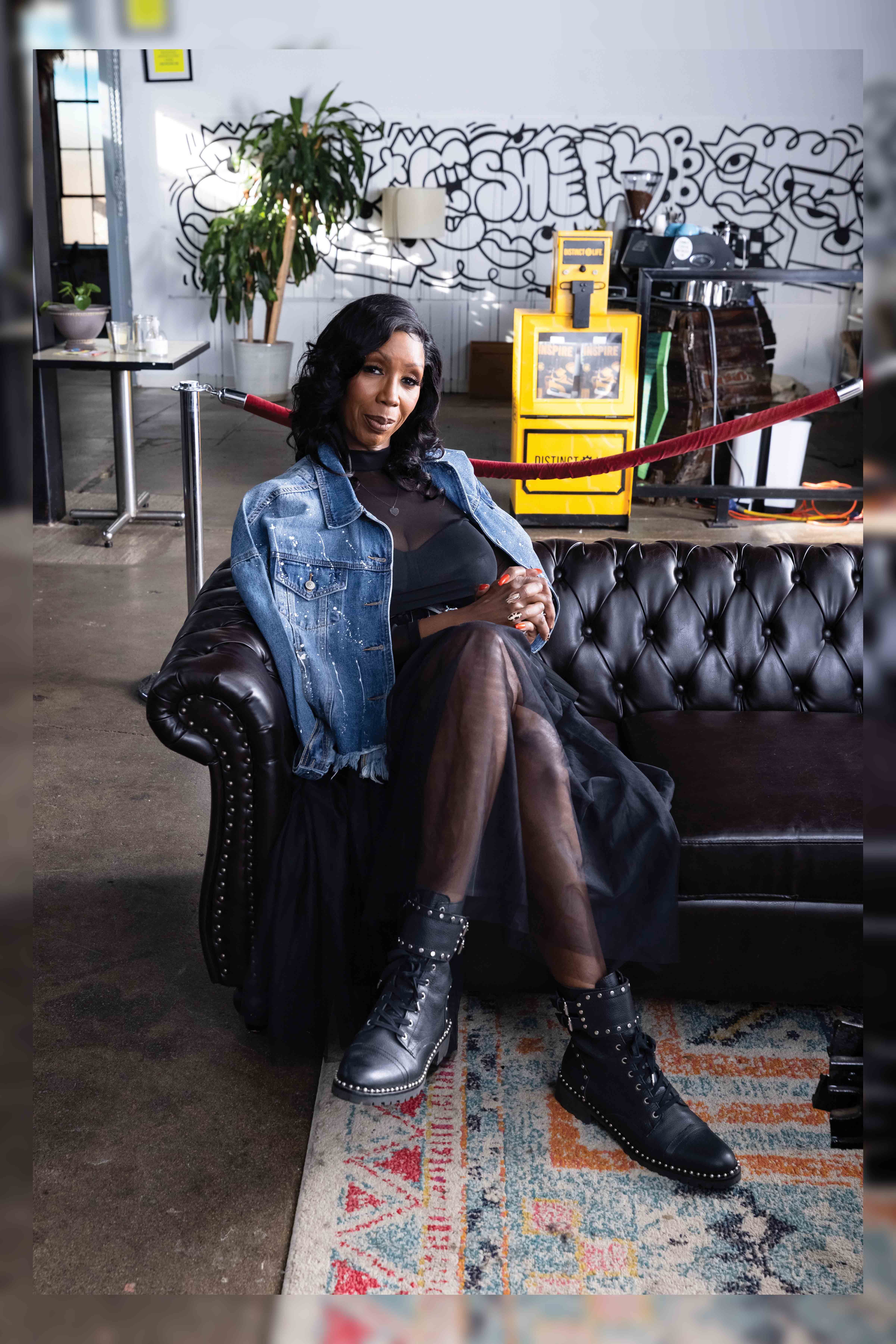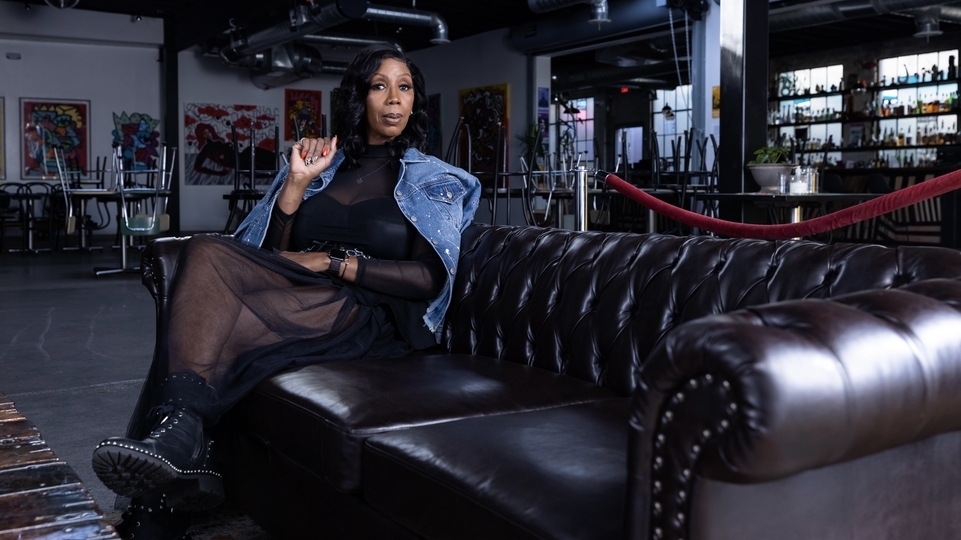
DJ Minx: Detroit's First Lady of Wax
Detroit's DJ Minx has been championing the electronic sounds of her hometown since day one, but has flown under the radar for much of her career. After publicly coming out in June, and with a stacked calendar of gigs and releases, she's busier and more fired up than ever. Here, she tells Ria Hylton about how she's ready for the next chapter in her journey, and to receive the overdue flowers she so richly deserves
If anybody’s paid their dues, it’s Jennifer Witcher, aka DJ Minx, Detroit’s “First Lady of Wax”. She’s been here all along, representing the future sounds of her hometown, building community, and playing key clubbing venues worldwide. She’s also found time to fashion a number of iconic beats, exciting dancefloors the world over. This summer, however, she was readying to share a different kind of message, one that would transform her personal and professional life, and unwittingly bring a renewed attention to her biography. She had written the post many times over, unsure of how and when she would share, but in the early hours of June 2nd, she finally found the words, opening with a characteristically Midwestern greeting.
“Whatupdoe! June is Pride month, so it felt like a good time to share a bit more about me. MY life — which is something I haven’t always found easy to do. Sometimes we struggle with showing our true identity, because we’re either told it’s wrong, feel uncomfortable sharing, or we just hide it for other reasons. A lot of times, we keep it to ourselves to appease others... I know some of y’all feel me on that. People suffer from emotional anxiety at the mere thought of “coming out,” but the stress of not doing so is taking up WAY too much of my space and is shaking my energy to the core. So here I am. Minx, DJ, producer, Momma, partner, lesbian, friend. I feel you are all important to me both personally and musically, so I wanted to share. I would certainly appreciate your ongoing support.”
And with that, Jennifer Witcher, 53 years old and finally out, closed her laptop and cried. “I was tired of being in the shadows,” she tells DJ Mag. “It was almost like I was carrying something that I didn’t want on me.”
A stalwart of the Detroit electronic music scene, Minx has flown below the radar for much of her career. She has played alongside, booked, and broken bread with Detroit’s techno pioneers, but until very recently, the international recognition enjoyed by many of those peers had eluded her. She threatened to quit the scene a number of times, but family and friends insisted she keep on. She’d gone this far already, after all.

When DJ Mag speaks with DJ Minx, it’s already been months since she came out, and she’s preparing to celebrate her 54th birthday. In the pale afternoon light, her thick-rimmed glasses and velvet red nails give off a playful but authoritative air. She’s an artful speaker, animated and humorous while paying attention to the flow of her storytelling. She’s also heavy on the cuss words, apt to recall an event with the same emotional charge she felt at the time.
Much like her music, Minx’s DJ sets roll deep, spanning minimal house and brooding techno, to old-school funk and full-bodied tech, always with an eye on the groove. She’ll ride the pitch on a CDJ the same way she does when working the vinyl, more concerned with slowly locking in the beat than fashioning the perfect blend, and barely dips below 130bpm. It’s hard to think of anyone working these sounds the way she does — is there, we ask? She cracks a broad, knowing smile: “I always say nobody plays like me. I play so wild.”
Having performed at every edition of Movement, Detroit’s annual flagship electronic festival, since its founding, set up more music businesses than she’d care to name, and nurtured a generation of local talent through her collective and record label Women On Wax — and all while working a full-time job — Minx is the true embodiment of Detroit’s colloquial motto: ‘Detroit hustles harder’. It’s taken her a while to get where she is today, and she has a few ideas about why, but there’s no doubt about the moment she fell in love with electronic music. It was the summer of 1989, and she was 21.
“I lived in downtown Detroit at the time. Some of my friends were saying, ‘Let’s go to the Music Institute!' and I said, ‘Institute? What kind of institution is open this late?’” she says, mimicking her disbelief. “My friend Des goes, ‘It’s a club, and it’s right down the street.’” Minx would normally head to Taboo, an R&B spot also located downtown, or to the Time Zone Arcade in Hazel Park, a 15-minute drive away. The Institute was not on her radar.
“I said, ‘Okay, what kind of music is it?’ and he said, ‘That’s techno music.’ I thought, ‘Oh God, who wants to hear that?’” she drawls. “‘That’s the music they play on the radio that never ends. It’s just one long track, and you don’t know what the hell is going on!’”
Luckily, Des won out, and soon the group of friends were on the five-minute walk to the club. As they turned the corner onto Broadway, she felt the rumbling bass, and noted the long line of partygoers outside the venue. “This security guy at the front was picking people off and letting them in one at a time, Studio 54 style. I said, ‘We’ve got to get in there!’ Forget about the fact that I didn’t want to hear any techno. I wanted whatever was inside that club.
“I climbed up and stood in the back to watch [Derrick] May. When he saw me, though, I left, because I was embarrassed. I didn’t want to bother him. The following week I skipped [attending], but I went the week after that, back into the booth. He’s jumping around, he’s spinning — and then he turned to me and said, ‘What are you looking at?’ I said, ‘I can do that,’ and he said, ‘Oh, okay,’ and went on playing. I immediately left. I was like, ‘Why did I say that? Why did I say anything to him?’ The next week, I went back to the booth and he looked at me and said, ‘Are you doing this yet?’ I said no, and he replied, ‘Don’t come back until you are.’”
“I thought, ‘What the fuck is wrong with this guy?’ I left the club and went back to my apartment. I was so embarrassed.”

“There was so much that I had to go through as a woman — we just didn’t get any respect, at least I didn’t."
Later, she spoke to her friend Gerry. “He said, ‘Well, you know what you have to do?’ ‘Yeah, nothing,’ I said. And he goes, ‘No, you have to start DJing. You don’t hear a challenge like that from Derrick May and do nothing. You have to DJ.’ I told him that I didn’t know how to, and he said, ‘Oh, but you’ll learn.’”
Minx credits her music career to that moment of provocation. But the memory is bittersweet, after an investigation by DJ Mag earlier this year revealed multiple reports of sexual assault and harassment against May. How did she feel when she heard about the reports? “It was a bit heartbreaking to hear this was going on,” she says, after a solemn pause. “I just looked up to him as the person who got me into playing the music I absolutely love today. I felt kind of defensive for him, but I never really got to know him.”
Over the next few months, in between her business school studies and a job at Rite Aid, Minx sat on her floor and practiced on the decks. She was also putting her business acumen to work. Inspired by the growing techno scene, she set up a mobile record store with Gerry and a mutual friend, ordering tracks from Downtown 161 in New York and other distributors. The trio would deliver records to local DJs in need of last-minute recommendations, often rocking up with curated selections from their collection. It was while delivering alone to local legend Bruce Bailey that she got her break.
“I went to deliver some tracks to Bruce, and while he was paying me, he said, out of the blue, ‘Hey, do you have a business card or something?’ I gave him this card Gerry had made for me, said, ‘Take care,’ and walked away. ‘Wait a minute,’ he shouted over to me. ‘You’re a DJ? Oh, shit! I’m having a party tonight. Do you think you could come by and play?’ I was like, ‘Where’s your party?’ Minutes later, Witcher was in her car, screaming at the top of her lungs. Bailey was known for hosting soulful house parties in and around the city. A well-connected DJ and booker, he was the kind of connection that could make or break a career. Minx immediately called Gerry. “Gerry’s always the coolest,” she recounts warmly. “He said, ‘Great, that’s awesome. What time are we going?’”

Hours later, Minx, Gerry, and six of their friends pulled up outside The Lofts club on Livernois. Located in Detroit’s Westside, the venue was similar to The Institute, with its sanded wood flooring and elevated DJ booth. But the soundsystem had its limits, and the crowd leaned toward the soulful side of things. The party was in full swing as the group approached the front desk, behind which sat two women.
“When I said I was the DJ, one of the ladies laughed,” she rasps. “The other said, ‘You’re what?’ I said, ‘I’m the DJ. My name is DJ Minx and Bruce has asked me to come play tonight.’ ‘I don’t see your name anywhere,’ says the other. I said, ‘Okay, thank you,’ turned around to leave — and Gerry’s right there, blocking me.”
The conversation enters a stalemate, with the door staff refusing to check the story with Bailey, and Gerry refusing to leave — until a friendly face intervenes. “Then the side door opens and this guy comes out and says, ‘Hey Minx — come on in! Where you going?’ I said, ‘Well, these ladies weren’t letting me in,’ and he looked at them and said, ‘Do you see that she has a bag of records? She’s not carrying it around as a purse.’”
A nervous Minx stepped into a pitch black room with a busy dancefloor, and was prodded in the direction of the booth. “They were playing a lot of soulful house, and I said to myself, ‘This shit in my bag is nothing like that. This is about to be different!’” she squeals. “My music was all deep and tech. That’s all I had, because that’s all I knew. That’s all I liked, and I only played what I liked.”
A sea of motionless faces turned to her as she dropped the needle on her first track — “they were all just looking up at me, nobody’s dancing” — but by the time she finished, some 20 minutes later, the dancefloor was heaving. “I looked to my left and I had two cheerleaders beside me: The women who were working the front door, they were screaming,” she smiles. “I’m still really good friends with them.”
The first outing was a success, but finding a way to play the sounds that inspired her, and in the style of her choosing, would prove tricky. The reason for this was the divide between the city’s soulful house and techno scenes. She straddled the two for a time, but her instincts began to lean in a new direction, not fully embracing either orthodoxy. Alongside Gerry, Minx found a trusted confidant in Kevin Saunderson. The two became acquainted in the mid-’90s through Minx’s then-husband, and have remained good friends since.

"I had to stop being concerned about other people. I just got tired of the obstacles and the negativity. I thought, ‘Let me just go ahead and make it happen. Fuck it, let’s go’. It’s time to do something.”
“Kevin’s like a brother to me. We’re really tight,” she says with real warmth. It was when Saunderson and his family moved in with Minx and her partner while his house was being built that they would sit up and talk shop. “We mainly talked about flawless mixing,” she remembers. “I was always intrigued as to how he got so good at what he did. He really flowed. Now, I knew how to mix back then, but I wanted to know how to mix better. I was always afraid to blend and ride the tracks together.”
Up to this point, Minx, still working with her belt-driven JBL turntables, opted for quick transitions. She was also still building a collection based on others’ tastes, something Saunderson slowly moved her away from.
“He would tell me, ‘You have to feel it, it’s a feeling’. He said he did it with little or no thought. ‘It’s easy, girl’ — that’s what he said. ‘When you get used to it, it’s really easy. You’re not gonna even think about it. You already sound good but in a minute, it’s gonna be easy for you’. That’s what made me get to the point of choosing tracks that I was feeling, more so than tracks that people might like to hear. I got into what I liked, and it helped the flow.”
By 1995, she started switching up her style, eschewing soulful house altogether, or only buying instrumentals and playing them much faster. The city took note, and she began to attract a different crowd. While some promoters turned their back on her more amped up offerings, others listened more closely.
Minx was working at General Motors and had just started touring internationally when Motor came calling in 1998. The venue, which would re-establish Detroit on the international DJ circuit, had opened in 1996 in Hamtramck, five miles north of the Motor City’s center. A riot the year prior had stalled the founders’ plans to purchase the old Music Institute location downtown, forcing them into the small city, which at the time, was mainly populated by Americans of Polish descent. In the short span of a year, it was attracting world-class DJs — Detroiters such as Saunderson, May, and Juan Atkins would, of course, frequent and play at the new spot, but so would Richie Hawtin and Fatboy Slim. Kraftwerk even dropped in for a memorable visit. A steady gig opening for top-tier international talent was just what she needed.
Bookers Linda G and Adriel Thorton got her on a three-way call, and G cut to the quick. “She immediately said, ‘So what are you doing every Saturday night, besides being a new resident DJ at Motor?’ Adriel was just laughing,” she chuckles. “They said they had been watching me, they loved the music I played, and that I was a good fit for a residency.” She accepted the offer, and in a full-circle moment, even opened for May. She remembers it like it was yesterday. “He came and stood behind me and watched. It was like my back was hot. When midnight hit and he went on, he said, ‘You know what, you really goddamn good with this. You are not fucking around.’”
It seemed like Minx’s star was in full ascent, but she shares a few war stories from this period. One in particular has her close to tears. In the early ’00s, she was booked for an all-vinyl DJ battle at Club 246 on Madison Avenue. She was the only woman in the 10-person lineup — and to the annoyance of some, won.
“There was so much that I had to go through as a woman — we just didn’t get any respect, at least I didn’t. I’m trying not to cry. I swear, I hate this shit.” One judge was audacious enough to state she would have lost if another DJ from out of town had showed up.
“A few days later, the gentleman that ran the battle said — and I don’t want to say his name, all the people that read about this fucker know who they are — ‘You know, they’re trying to do this over again, because they were saying that Steve wasn’t able to make it because of the snow.’ I said, ‘Well, doesn’t that disqualify him?’ They just voided my shit.” The battle was rescheduled and, with a heavy heart, Minx re-entered it.
“I had this feeling in my stomach, I was very upset.” The DJ who had failed to show in the first round was a turntablist living out of town. In a thinned-out lineup, with others having dropped out and her confidence diminished, Minx wasn’t in the game. “He’s very good and he won the battle. Guess who came second? Those are the things I had to deal with.”

Moments like this would stand out in any career, and there are certainly more stories to share, but Minx doesn’t attribute her slow rise to these moments alone. “I didn’t get a lot of support, but on the other hand, I think considering what I’ve dealt with throughout my life, it wasn’t easy for me to ask for support either. I always had an issue with people letting me down, so it was always hard for me to ask for help.”
The Witcher family moved from Georgia to Michigan in 1966, a year before the Detroit Rebellion, one of the deadliest American riots of the 20th century. Jennifer, the youngest sibling of five and the only child to be born in Detroit, arrived the following fall in 1967. Like many other Black working-class Americans, her parents had migrated north for better work opportunities. Her father landed a job as a truck driver at the Eastern Market district, and eventually trained as a mechanic. Before she reached her teens, he owned a gas station and was managing three others. She worked alongside him on Saturday mornings and learned the business ropes. “My dad was a major influence because he was a businessman,” she says with pride. “He had a lot of girlfriends, but he always looked after his children and fed me knowledge.”
Family life wasn’t to last. Her mother, tired of her father’s infidelities, left when Jennifer was 11 years old. She took Jennifer’s older sister with her, leaving her behind with her three older brothers. To this day, she struggles to come to terms with it. “I kept asking her if I could come to be with her, but she would just say, ‘I’m busy'. I was so distraught.”
Disappointment she felt as a child followed Witcher into adulthood, fueling her will to succeed as Minx. She had been performing internationally for two years when she met the second man she would marry. We don’t learn his name, only that he “was very handsome, six foot six” and the father of Minx’s last child. Witcher was becoming more conscious of her attraction to women at the time, and had what she calls “connections,” but peer pressure kept her silent. “I couldn’t disclose how I actually, you know, felt about being with a woman to anyone, so I just kept it to myself.”
Her-soon-to-be husband, who she met at what was then called the Detroit Electronic Music Festival, began to clamp down on her music career, and by 2001, had all but vetoed her international gigs. The local gigs began to fold, too. “I didn’t fit the soulful spaces anymore, and then I didn’t know where I fit,” she says disparagingly. “So I just did what I was asked to do, which was very rare. I mean, I don’t know how often I played.”
It was in 2001, at the behest of Moodymann, that Minx began producing. Friend and soulful house DJ Sarena Tyler showed her the ropes, which resulted in the ‘Introduction’ EP. This was quickly followed by 2002’s ‘Airborne’, a four-tracker which housed future minimal classic ‘Walk In The Park’. Ricardo Villalobos played the track one fateful evening in a back-to-back set with Richie Hawtin, who quickly began scouring the city for its author. With Minx’s permission, Hawtin re-released it on his Minus label with remixes from himself and Josh Wink — and the rest is history.
“It was the simplest beat, but it had the biggest impact on my career,” Minx says. “I think the bassline is what drew a lot of people to the track.” That three-note bassline and warm, skippy rhythm section, made in the 45 minutes that Minx’s husband was out of the house, lit up dancefloors the world over.
A handful of tracks trickled through her Women On Wax label in following years, but it became impossible to balance work and music life, especially in an increasingly restrictive home.
“I went through a lot, producing music at home,” Minx confides. “That is one of the reasons why it was hard for me to get back to where I am now. I started to fade, because I had to deal with the home life.”
It was during this second marriage, while Witcher slept upstairs and her husband in the basement, that she decided to confront her feelings towards women. She suggested they separate, found a temporary place to live, and broke the news to the kids. “We sat down and we had a conversation with them about it. And then my youngest daughter said, ‘Ooh — am I going to have my own room?’ I said yes, and she said, ‘Yay! Can I go ride my bike now?’
“Then he got really angry,” she whispers. “He got upset.” He got up from the couch and went upstairs, and moments later, items from Witcher’s bedroom were flying into the living room. “He destroyed like, 90 percent of my stuff in front of the kids. It was horrible.”

She left there and then, returning a few days later to find the locks had been changed. After punching her way back into the house — via the milk chute — and collecting a few personal items, she stepped out into the street and into her new life. She was divorced by 2012, and was back to international tours in 2014.
The tide began to turn in Minx’s favor around the time of the Movement Festival 2017. It would be her 18th appearance, and she was scheduled to play an early set at the Made In Detroit stage, which was empty. The rain, which had muddied the ground, clung to her dress and sandals. She braced herself and headed to the muddy stage. “I had my record bag and people helped me on the stage. They thought that because I looked like this, I’m not just about to do some murdering — and I love it when that happens,” she laughs. “I always say, ‘No matter how much of a lady I look, don’t let this shit fool you.’”
Minx played a deep, rollicking set, which began — and remained — well above 130bpm. Five tracks in, and she had not only packed out the area, but had many seasoned promoters wondering how they had missed her. An RA review called the performance “one of the revelations of the weekend,” which may have played a part in the ensuing scramble for her sound.
“That particular year at Movement is when the following was built for me,” she concludes. “That’s when things started to pick up.” Her bookings increased, and in 2018, she received the city council’s Spirit of Detroit award.
But in January 2019, General Motors announced a new wave of redundancies. It was something Witcher had witnessed time and again, and resolved to leave quietly when it was her time. “I made up my mind that if I was one of the people they let go, I was not going to look back. I was going full-on music, I was gonna commit to production, and I was gonna get out there more.”
She got to work on the ‘Violet Groove EP’, which included the re-release of the sensual ‘Paris To 313’ and ‘Walk In The Park (Stay)’. The spirited bounce and battle-ready cuts on this record were a thumping return to form, and the first project she completed after the leaving GM. She followed it up with the politically charged ‘Blink Amerikkka’ in January this year, a biting commentary on the country’s past and present, to rave reviews throughout the electronic music community. Her EP collaboration, ‘Tronic D’, with Gari Romalis, landed in April, and included 2014’s ‘Stiletto Stroll’, a hazy synth-laden cut, and ‘A Cocktail Or Two’, which had her signature swing and layered rhythm section.
By then, Minx was on a roll, releasing ‘Purse First’ days after coming out, the ‘Queendom EP’ with queer collective HE.SHE.THEY in September, and most recently a remix of Saunderson’s iconic ‘Uptempo’. The 2022 calendar is looking good too. February will see the 20th anniversary of ‘Walk In The Park’, with remixes courtesy of Carl Craig, DJ Holographic, Soul Clap, and Ardalan, and she has a number of national and international festivals lined up for the early part of the year. In another full-circle moment, Movement has asked her to host a stage at the festival’s next edition, a professional first in the 22 years she’s played there. What does she make of this turn of events?
“It has been a very long time,” she replies. “I used to ask myself, ‘What am I not doing? What am I missing?’ and there have been a few times when I said, ‘I’m not doing this anymore. I’m spending my wills, I’m wasting my time. This is not for me.’ But then again I had to stop being concerned about other people. I just got tired of the obstacles and the negativity. I thought, ‘Let me just go ahead and make it happen. Fuck it, let’s go’. It’s time to do something.”
At the age of 54, Minx has never been more busy, and as the only fully-out gay Black woman from the birth of techno, the cultural landscape has finally moved in her favour. It has been a turbulent journey of over three decades, but Minx — Momma, partner, lesbian, friend — is finally getting her flowers, and it’s more than deserved.





